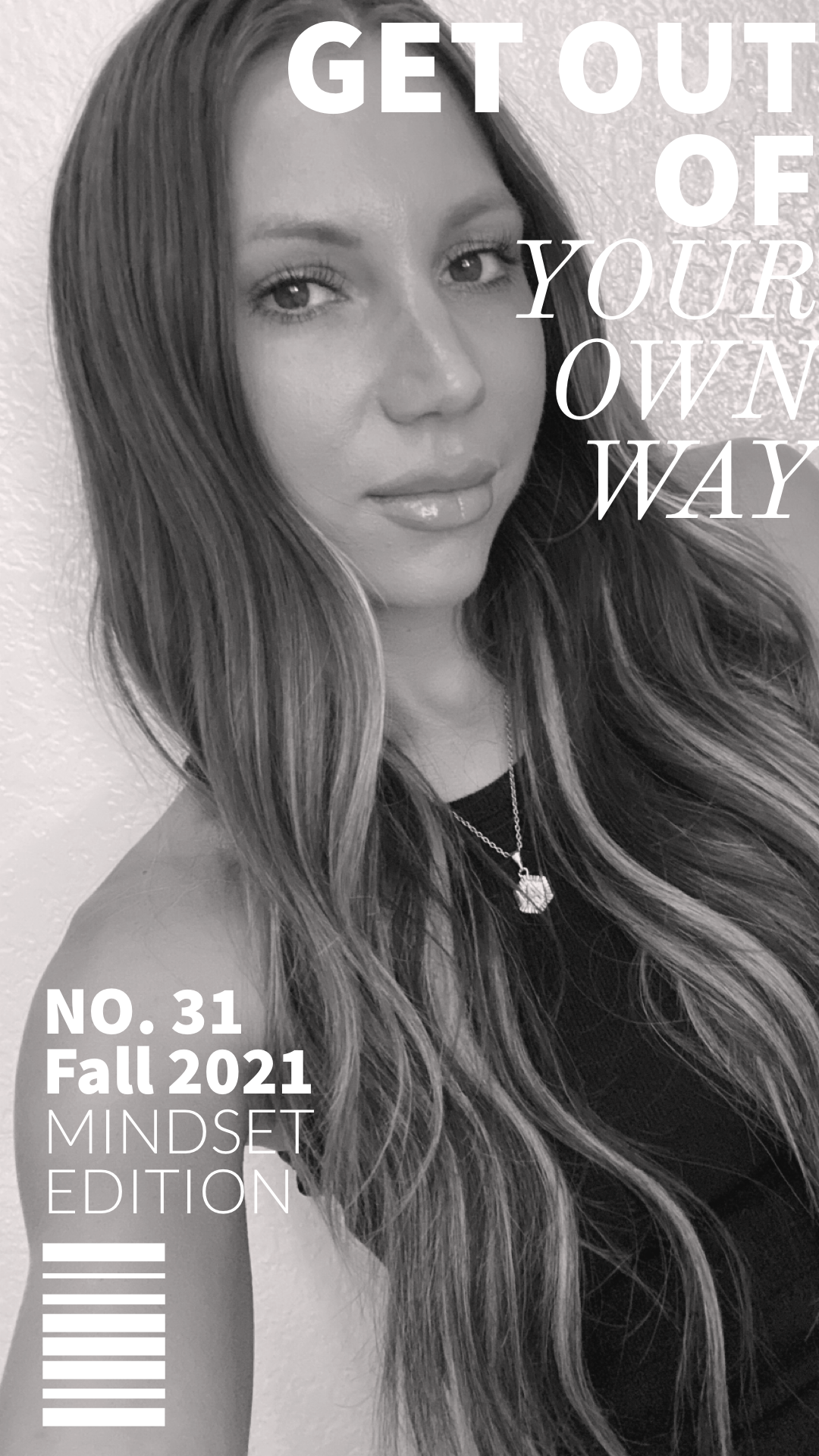LESS TALKING, MORE SPEAKING
Update: 2021-12-03
Description
Hi, ladies, and welcome back to the Ashlee Jaine show. You are absolutely in the right place if you are looking for mindset inspiration to help you glow up and show up as the very best version of yourself. In today's episode, we are going to be discussing, talking and speaking, which is funny because I literally am doing nothing but talking and speaking for this entire podcast episode, but I really hope that what you get from this episode, you can take and apply into your own life and help better yourself all around because of it. So when I say less talking and more speaking, I want to take a moment to explain the difference because there is a difference in my mind. So talking is just saying words. It's saying things that don't really carry weight, that don't really necessarily have an impact. But when you speak, on the other hand, you are speaking with emphasis. You are sharing value. You are saying something that does carry weight and that does have an impact. And that's really what I want your focus to be on. I think that there's a lot of people in this world, myself included, who are just really uncomfortable with silence in general, especially US ladies, right? We love to talk and we can banter and chit chat back and forth for hours.
We are notorious at doing this and it's a great way for us to connect. But there are definitely times when sometimes we need to embrace that awkward silence and we need to really just figure out or help cipher through what we're saying to make sure that when we do speak, we are speaking and we are providing value and we are providing some sort of impact with what we are saying. We don't just want to say words because what happens when we just say a bunch of things without carrying any weight or value? People start to not take us seriously. It almost actually blows up in our face. While you know a lot of people, I think when they are talking, they tend to talk on topics that they know about. Sometimes they just may go overboard with an explanation. Or maybe it's just a habit to just talk and talk and talk. But when you're doing this, you're taking away from the message that you're really trying to relay and the importance of what you're actually trying to say. By filling it with words, you need to make sure that when you are speaking, you have a crystal clear message. You are concise with your words. You are saying it with emphasis and you are providing it in a way that the person who is listening can receive it and obtain the value or the emphasis that it has.
So in conversation, there's nothing wrong with going back and forth on whatever it may be current events or, you know, talking about family or relationships or whatever it is that you're having this conversation about with your friend or your family member or whoever it is, definitely take the time to speak your mind and to share what you have to say on the matter, but filter through what you want to say versus what you should say and ask yourself if I say this, is it going to provide value? Is it going to carry weight? Will there be emphasis on this message? Don't let your message or your response, or whatever it may be that you are putting out there get smothered essentially by all of these other things that you're saying. You want to show up in a way that people are going to respect and people are truly going to listen to you. And that's another aspect of this. When you're talking, you're not giving anybody the opportunity to communicate back with you. You're just filling space. Your words are just filling air. And it gives no opportunity for you to listen, which is one of the most important things that we can do when communicating. Not only does it help others who we are communicating with, feel received and feel heard and feel understood and help overall connect us as human beings. But also it gives us. The opportunity to learn to learn more about the situation, to learn more about the person and to learn more about what is being said, what their message is.
So when we're filling the time and air with a bunch of words with a bunch of nonsense that really doesn't even need to be said, we're taking away from all of that. We're taking away from ourselves and the impact that we're trying to make by what we say. And we're taking away the human connection element by not listening to what the other person is saying, and we're taking away the opportunity to learn by listening. So really, this is a multifaceted topic, and I want you to understand that there is such a thing as talking too much and there is such a thing as discrediting or devaluing your words, your statement, your message, whatever that may be, and the chances are that you probably do it on a fairly regular basis. Now, I'm not saying this to shame anybody because Lord knows I am a talker. I always have been. I can remember getting in trouble in school when I was a little girl for talking because I love to talk, I love to talk to people, I love to connect with people. It is just a part of who I am, and I have been that person who can't stand the awkward silence and who really tries to fill that void or that space with words and just honestly saying things that don't really matter in the grand scheme of things.
I would have the small talk conversation about the weather or whatever it may be, because I didn't want that awkward silence, and I felt like that awkward silence would be a missed moment to communicate or miss a moment to talk. And so I would fill it with something completely irrelevant. And I think that we all can relate to that because I think that we have all done the same thing. Now there's nothing wrong with small talk. Don't get me wrong, especially if it's an opportunity to lead into a more impactful conversation. But you shouldn't spend an hour talking about Excuse my French, but bullshit. Like, you really have better things to do with your time. Then have those conversations and have that banter back and forth. You want to have impactful and meaningful conversations with people, and when you speak, you want to be heard and when they speak, they want to be listened to. So reevaluate your conversations in what you're saying and what you're doing with the people around you and what the people that you talk to on a regular basis and ask yourself, try to come up with some sort of filter where you can filter out what is relevant, what is not relevant, what will provide value, what will not provide value, what will make an impact and what will not make an impact. The analogy that I really like to use in this is giving advice to your girlfriend about a relationship. We all do it, even though we probably shouldn't, because the only person they should be listening to is their intuition.
But when we give advice about a relationship, if we say too much, what we say is going to be lost on deaf ears. And if we really try to craft our message and speak intentionally and share our true feelings and our true thoughts in is minimal amount of words as possible. That's what they're going to take back. That's what they're going to remember. So if you've got a girlfriend and she's going through some shit with her boyfriend or her husband and you want to be the person to be there for them and to help guide them through this, maybe it's a situation very similar to one that you've been through. You want to make sure that what you leave her with is so impactful it will help jog her brain and help get her thinking in a different perspective other than her own to reevaluate the relationship in the situation that she's in. So think about that sort of scenario and how you would normally respond to her complaints or her asking for your help or your guidance, and think about how you could best create an impact and provide value and emphasis in what you respond to her. Those are two very different answers. Those are two very different conversations. And honestly, I cannot stress this enough. I have been there. I have done this a million times up until very recently. If I'm being completely honest, I think I've realized that the weight of what we say is more important.
It's almost like the quality over quantity. Of what we say. I was notorious for saying too much, and now I'm at a point in my life where it's almost like, I say too little. I think some people would prefer if I spoke more, but it's given me the opportunity to make sure that when I do speak and that when I do share something, whether it's information or perspective or whatever it may be, it carries weight. It has an impact and it provides value. We live in a day and age where there is so much chatter in the world, there's so much going on around us. We can literally open our phones and go to our text messages, go to our social media apps, go somewhere and get people's opinions, people's perspectives. Seeing what they're saying. Hearing what they're saying. Maybe if you're on Clubhouse, I don't know. I can't figure that social media out for the life of me, but whatever. So whatever it is, you can always pull information of what people are saying from anywhere. And I think that it's a blessing and a curse because it lets all of us share, you know, our inner lives with each other, share our perspectives, our ideas, our value with others. But at the same time, if we're not selective and if we're not filtering out the noise and the nonsense, then we're all just drowning each other out.
It literally just becomes white noise at that point. Nobody's paying attention. Nobody cares. Because why? Because we're talking too much and we need to focus more on speaking. We need to focus more on having a clear and concise message that provides value that carries weight. And most importantly, that will have an impact. So your homework from this podcast, if you have made it this far, I applaud you and thank you for being here. I know your time is valuable, and I also know that you want to show up as the very best version of
We are notorious at doing this and it's a great way for us to connect. But there are definitely times when sometimes we need to embrace that awkward silence and we need to really just figure out or help cipher through what we're saying to make sure that when we do speak, we are speaking and we are providing value and we are providing some sort of impact with what we are saying. We don't just want to say words because what happens when we just say a bunch of things without carrying any weight or value? People start to not take us seriously. It almost actually blows up in our face. While you know a lot of people, I think when they are talking, they tend to talk on topics that they know about. Sometimes they just may go overboard with an explanation. Or maybe it's just a habit to just talk and talk and talk. But when you're doing this, you're taking away from the message that you're really trying to relay and the importance of what you're actually trying to say. By filling it with words, you need to make sure that when you are speaking, you have a crystal clear message. You are concise with your words. You are saying it with emphasis and you are providing it in a way that the person who is listening can receive it and obtain the value or the emphasis that it has.
So in conversation, there's nothing wrong with going back and forth on whatever it may be current events or, you know, talking about family or relationships or whatever it is that you're having this conversation about with your friend or your family member or whoever it is, definitely take the time to speak your mind and to share what you have to say on the matter, but filter through what you want to say versus what you should say and ask yourself if I say this, is it going to provide value? Is it going to carry weight? Will there be emphasis on this message? Don't let your message or your response, or whatever it may be that you are putting out there get smothered essentially by all of these other things that you're saying. You want to show up in a way that people are going to respect and people are truly going to listen to you. And that's another aspect of this. When you're talking, you're not giving anybody the opportunity to communicate back with you. You're just filling space. Your words are just filling air. And it gives no opportunity for you to listen, which is one of the most important things that we can do when communicating. Not only does it help others who we are communicating with, feel received and feel heard and feel understood and help overall connect us as human beings. But also it gives us. The opportunity to learn to learn more about the situation, to learn more about the person and to learn more about what is being said, what their message is.
So when we're filling the time and air with a bunch of words with a bunch of nonsense that really doesn't even need to be said, we're taking away from all of that. We're taking away from ourselves and the impact that we're trying to make by what we say. And we're taking away the human connection element by not listening to what the other person is saying, and we're taking away the opportunity to learn by listening. So really, this is a multifaceted topic, and I want you to understand that there is such a thing as talking too much and there is such a thing as discrediting or devaluing your words, your statement, your message, whatever that may be, and the chances are that you probably do it on a fairly regular basis. Now, I'm not saying this to shame anybody because Lord knows I am a talker. I always have been. I can remember getting in trouble in school when I was a little girl for talking because I love to talk, I love to talk to people, I love to connect with people. It is just a part of who I am, and I have been that person who can't stand the awkward silence and who really tries to fill that void or that space with words and just honestly saying things that don't really matter in the grand scheme of things.
I would have the small talk conversation about the weather or whatever it may be, because I didn't want that awkward silence, and I felt like that awkward silence would be a missed moment to communicate or miss a moment to talk. And so I would fill it with something completely irrelevant. And I think that we all can relate to that because I think that we have all done the same thing. Now there's nothing wrong with small talk. Don't get me wrong, especially if it's an opportunity to lead into a more impactful conversation. But you shouldn't spend an hour talking about Excuse my French, but bullshit. Like, you really have better things to do with your time. Then have those conversations and have that banter back and forth. You want to have impactful and meaningful conversations with people, and when you speak, you want to be heard and when they speak, they want to be listened to. So reevaluate your conversations in what you're saying and what you're doing with the people around you and what the people that you talk to on a regular basis and ask yourself, try to come up with some sort of filter where you can filter out what is relevant, what is not relevant, what will provide value, what will not provide value, what will make an impact and what will not make an impact. The analogy that I really like to use in this is giving advice to your girlfriend about a relationship. We all do it, even though we probably shouldn't, because the only person they should be listening to is their intuition.
But when we give advice about a relationship, if we say too much, what we say is going to be lost on deaf ears. And if we really try to craft our message and speak intentionally and share our true feelings and our true thoughts in is minimal amount of words as possible. That's what they're going to take back. That's what they're going to remember. So if you've got a girlfriend and she's going through some shit with her boyfriend or her husband and you want to be the person to be there for them and to help guide them through this, maybe it's a situation very similar to one that you've been through. You want to make sure that what you leave her with is so impactful it will help jog her brain and help get her thinking in a different perspective other than her own to reevaluate the relationship in the situation that she's in. So think about that sort of scenario and how you would normally respond to her complaints or her asking for your help or your guidance, and think about how you could best create an impact and provide value and emphasis in what you respond to her. Those are two very different answers. Those are two very different conversations. And honestly, I cannot stress this enough. I have been there. I have done this a million times up until very recently. If I'm being completely honest, I think I've realized that the weight of what we say is more important.
It's almost like the quality over quantity. Of what we say. I was notorious for saying too much, and now I'm at a point in my life where it's almost like, I say too little. I think some people would prefer if I spoke more, but it's given me the opportunity to make sure that when I do speak and that when I do share something, whether it's information or perspective or whatever it may be, it carries weight. It has an impact and it provides value. We live in a day and age where there is so much chatter in the world, there's so much going on around us. We can literally open our phones and go to our text messages, go to our social media apps, go somewhere and get people's opinions, people's perspectives. Seeing what they're saying. Hearing what they're saying. Maybe if you're on Clubhouse, I don't know. I can't figure that social media out for the life of me, but whatever. So whatever it is, you can always pull information of what people are saying from anywhere. And I think that it's a blessing and a curse because it lets all of us share, you know, our inner lives with each other, share our perspectives, our ideas, our value with others. But at the same time, if we're not selective and if we're not filtering out the noise and the nonsense, then we're all just drowning each other out.
It literally just becomes white noise at that point. Nobody's paying attention. Nobody cares. Because why? Because we're talking too much and we need to focus more on speaking. We need to focus more on having a clear and concise message that provides value that carries weight. And most importantly, that will have an impact. So your homework from this podcast, if you have made it this far, I applaud you and thank you for being here. I know your time is valuable, and I also know that you want to show up as the very best version of
Comments
In Channel












